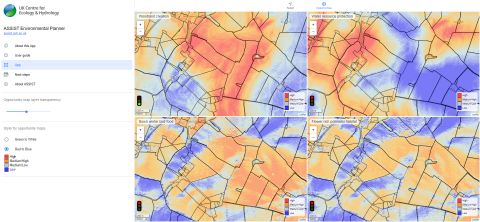A free web-based support tool will enable farmers to deliver environmental improvements and potentially attract payments for providing ‘public money for public goods’ under the new agri-environment scheme.
The new Environmental Planner tool (E-Planner) has been produced by the UK Centre for Ecology & Hydrology (UKCEH) to help farmers make decisions on which agri-environment options to introduce and where these are likely to work best. It uses detailed environmental data at a resolution of just five metres on all two million-plus fields across Great Britain.
The tool analyses satellite and aerial imagery plus other national-scale datasets to assess the suitability of unproductive or hard-to-farm areas of land for four agri-environment interventions. These are: planting flower-rich pollinator habitats; creating woodland; protecting water resources from pollution; and, sowing winter bird food – categories that are expected to be eligible for farming subsidies under the new Environmental Land Management (ELM) scheme. The analysis is based on a range of factors including soils, nearby habitats, slope and shading.

Suitability of land for a particular agri-environment option is shown on the tool through colour shading, ranging from red being very suitable to dark blue, unsuitable.
The ELM scheme will replace the farming subsidy system of the Common Agricultural Policy (CAP) in England, worth around £2bn to English farmers every year. Farmers will be expected to deliver an increasing range of environmental benefits as well as producing food under the new subsidy schemes. Next year, ahead of ELM’s rollout in 2024 Defra will be starting pilot projects, some of which UKCEH will be involved in.
John Redhead, senior Spatial Ecologist at the UK Centre for Ecology & Hydrology (UKCEH), who led the development of the E-Planner tool, says: “Bringing together environmental information from digital data, how-to guides and farmers’ own local knowledge can be challenging and time consuming, so the tool will help users to make informed decisions quickly and easily. It will assist farmers and land managers in transforming unproductive, loss-making parts of their farm into environmentally friendly uses that may attract a public subsidy.”
UKCEH has more than 20 years’ experience in designing and monitoring agri-environment schemes, and already works extensively with Defra as well as farms and farming organisations across the country. It is now working with the farming industry to validate and further develop the E-Planner.
The tool will assist farmers and land managers in transforming unproductive, loss-making parts of their farm into environmentally friendly uses that may attract a public subsidy - John Redhead
The tool has been created by UKCEH as part of ASSIST, a six-year £12m National Capability research programme, funded by the Natural Environment Research Council (NERC).
Professor Richard Pywell, Head of Biodiversity at UKCEH, who leads the ASSIST programme, explains: “Our free E-Planner tool is another important part of the toolkit for farmers and land managers, helping them achieve the ambitions of the new Agriculture Bill and 25 Year Environment Plan, to maintain and enhance the natural world.
“More environmentally sustainable farming methods, such as measures to support insect pollinators, reduce soil erosion and planting trees not only improve agricultural productivity, but also benefit wildlife and society too.”
To find out more about the E-Planner tool, you can listen to Professor Pywell launch the tool in a free Digital and Data Innovation webinar as part of Cereals LIVE 2020 at 15:30 today (Thursday 11th June).
To use the free Environmental Planner tool, visit https://assist-e-planner.ceh.ac.uk/
Notes to editors
About the E-Planner tool
Different areas of land, at a resolution of five metres, are assessed for the four possible environmental management options. Suitability is then shown through colour shading, ranging from red being very suitable to dark blue, unsuitable.
- Flower-rich pollinator habitats – sowing of pollen- and nectar-producing flowers to support populations of insect pollinators
- Woodland creation – supporting national tree planting initiatives, mitigating flooding and erosion, carbon storage and capture, supporting woodland biodiversity
- Water resource protection – preventing pollution run-off into nearby water courses by sowing grass buffer strips or planting cover crops
- Sown winter bird food – sowing seed-bearing crops to provide winter food for declining seed-eating farmland birds
Although the ELM scheme is still being developed, these four areas have been eligible for subsidies in previous UK Government environment schemes and are identified in the Agriculture Bill and 25 Year Environment Plan.
Follow our tweets with #ASSIST_EPlanner
About the ASSIST (Achieving Sustainable Agricultural Systems) programme
The UK Centre for Ecology & Hydrology is working in partnership with Rothamsted Research and the British Geological Survey on ASSIST, which runs from 2016-2022. With support from the farming industry, it will provide new knowledge, data, tools and an infrastructure of study farms to meet the challenge of feeding growing populations without causing unacceptable environmental damage. This £12m National Capability programme is funded by the Natural Environment Research Council (NERC) and the Biotechnology and Biological Sciences Research Council (BBSRC). https://assist.ceh.ac.uk/
About the UK Centre for Ecology & Hydrology (UKCEH)
The UK Centre for Ecology & Hydrology is a centre for excellence in environmental science across water, land and air. Our 500 scientists work to understand the environment, how it sustains life and the human impact on it – so that together, people and nature can prosper.
We have a long history of investigating, monitoring and modelling environmental change, and our science makes a positive difference in the world. The issues our science addresses include: air pollution, biodiversity, biosecurity, chemical risks, extreme weather events, droughts, floods, greenhouse gas emissions, land use, soil health, sustainable agriculture, sustainable ecosystems, sustainable macronutrient use, and water resources management.
The UK Centre for Ecology & Hydrology is a strategic delivery partner for the Natural Environment Research Council, part of UK Research and Innovation. www.ceh.ac.uk / @UK_CEH
For media enquiries
For interviews and further information, please contact Simon Williams, Media Relations Officer at UKCEH, via simwil@ceh.ac.uk or +44 (0)7920 295384.